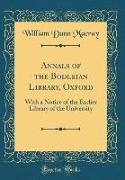Read more
Excerpt from Annals of the Bodleian Library, Oxford: With a Notice of the Earlier Library of the University
When this book was first published twenty-two years ago, it was found to appeal to the interest of so limited a class of readers, although one which in the course of years has gradually made it to become somewhat scarce, that the idea of publishing a second edition was never entertained by me. The accumulation of additional notes, indeed, continually went on, but it was with the idea of giving an enlarged copy some day to the Library in the belief that after my death it would be found useful. But it is owing to the present Librarian that this second edition now appears under my own eye and care. For the book had become a manual of such continual use in the Library'that the Librarian was desirous that the additional matter should be rendered avail able while a last inheritor of some traditional information and a last associate in some details and labours under the man agement that existed fifty years agostill survives on the staff. And it is with much pleasure that I acknowledge the interest he has shown throughout, and the useful suggestions he has from time to time made. To Mr. Falconer Madan also, whose interest in the progress of the work has been equally sustained, I am indebted for frequent and cordial assistance. And to the Delegates of the University Press I desire to tender my thanks for liberally undertaking the publication.
About the Publisher
Forgotten Books publishes hundreds of thousands of rare and classic books. Find more at www.forgottenbooks.com
This book is a reproduction of an important historical work. Forgotten Books uses state-of-the-art technology to digitally reconstruct the work, preserving the original format whilst repairing imperfections present in the aged copy. In rare cases, an imperfection in the original, such as a blemish or missing page, may be replicated in our edition. We do, however, repair the vast majority of imperfections successfully; any imperfections that remain are intentionally left to preserve the state of such historical works.

